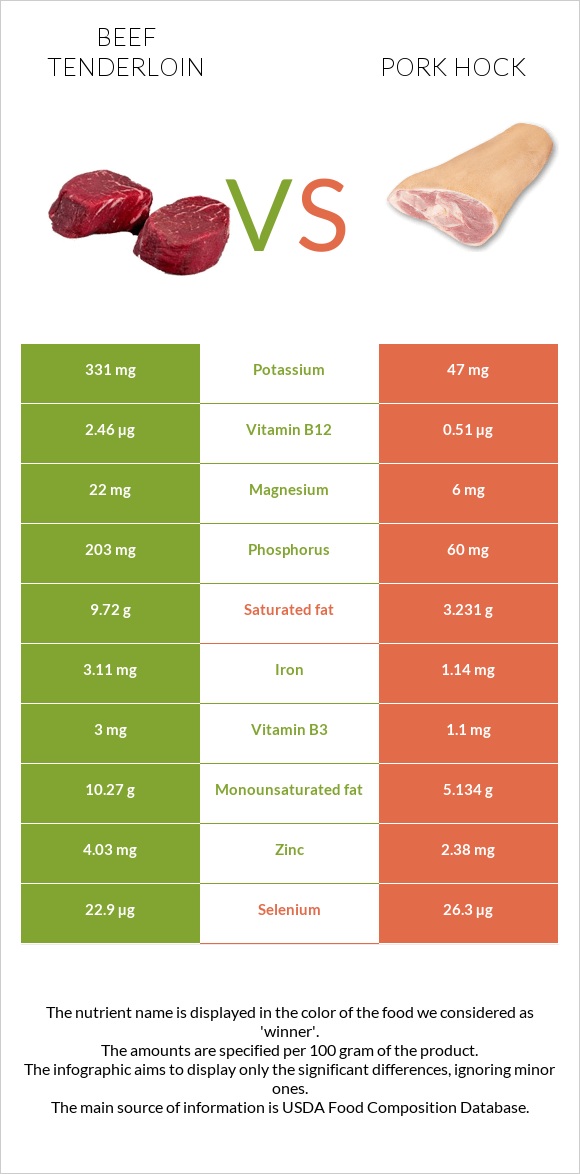Beef tenderloin vs. Pork hock — In-Depth Nutrition Comparison
Compare
What are the differences between beef tenderloin and pork hock?
- The amount of vitamin B12, iron, phosphorus, zinc, vitamin B2, vitamin B6, vitamin B3, and potassium in beef tenderloin is higher than in pork hock.
- Beef tenderloin's daily need coverage for vitamin B12 is 81% more.
- Pork hock contains 7 times less potassium than beef tenderloin. Beef tenderloin contains 331mg of potassium, while pork hock contains 47mg.
- Pork hock has less saturated fat.
We used Beef, tenderloin, roast, separable lean, and fat, trimmed to 1/8" fat, all grades, cooked, roasted and Pork, pickled pork hocks types in this article.
Infographic

Infographic link
Mineral Comparison
Mineral comparison score is based on the number of minerals by which one or the other food is richer. The "coverage" charts below show how much of the daily needs can be covered by 300 grams of the food.
| Contains more MagnesiumMagnesium | +266.7% |
| Contains more PotassiumPotassium | +604.3% |
| Contains more IronIron | +172.8% |
| Contains more CopperCopper | +50% |
| Contains more ZincZinc | +69.3% |
| Contains more PhosphorusPhosphorus | +238.3% |
| Contains less SodiumSodium | -94.6% |
| Contains more CalciumCalcium | +111.1% |
| Contains more ManganeseManganese | +57.1% |
| Contains more SeleniumSelenium | +14.8% |
Vitamin Comparison
Vitamin comparison score is based on the number of vitamins by which one or the other food is richer. The "coverage" charts below show how much of the daily needs can be covered by 300 grams of the food.
| Contains more Vitamin B1Vitamin B1 | +12.5% |
| Contains more Vitamin B2Vitamin B2 | +282.4% |
| Contains more Vitamin B3Vitamin B3 | +172.7% |
| Contains more Vitamin B6Vitamin B6 | +290.6% |
| Contains more Vitamin B12Vitamin B12 | +382.4% |
| Contains more FolateFolate | +700% |
| Contains more Vitamin AVitamin A | +∞% |
| Contains more Vitamin B5Vitamin B5 | +37.6% |
All nutrients comparison - raw data values
| Nutrient |  |
 |
DV% diff. |
| Vitamin B12 | 2.46µg | 0.51µg | 81% |
| Sodium | 57mg | 1050mg | 43% |
| Saturated fat | 9.72g | 3.231g | 29% |
| Iron | 3.11mg | 1.14mg | 25% |
| Fats | 24.6g | 10.54g | 22% |
| Phosphorus | 203mg | 60mg | 20% |
| Choline | 91mg | 17% | |
| Zinc | 4.03mg | 2.38mg | 15% |
| Vitamin B2 | 0.26mg | 0.068mg | 15% |
| Vitamin B6 | 0.25mg | 0.064mg | 14% |
| Monounsaturated fat | 10.27g | 5.134g | 13% |
| Vitamin B3 | 3mg | 1.1mg | 12% |
| Protein | 23.9g | 19.11g | 10% |
| Calories | 324kcal | 171kcal | 8% |
| Potassium | 331mg | 47mg | 8% |
| Selenium | 22.9µg | 26.3µg | 6% |
| Copper | 0.123mg | 0.082mg | 5% |
| Magnesium | 22mg | 6mg | 4% |
| Vitamin A | 0µg | 23µg | 3% |
| Vitamin B5 | 0.25mg | 0.344mg | 2% |
| Folate | 8µg | 1µg | 2% |
| Cholesterol | 85mg | 89mg | 1% |
| Calcium | 9mg | 19mg | 1% |
| Vitamin E | 0.17mg | 1% | |
| Vitamin B1 | 0.09mg | 0.08mg | 1% |
| Polyunsaturated fat | 1g | 1.198g | 1% |
| Manganese | 0.014mg | 0.022mg | 0% |
| Trans fat | 0.113g | N/A | |
| Tryptophan | 0.268mg | 0.038mg | 0% |
| Threonine | 1.044mg | 0.516mg | 0% |
| Isoleucine | 1.075mg | 0.325mg | 0% |
| Leucine | 1.889mg | 0.841mg | 0% |
| Lysine | 1.989mg | 0.822mg | 0% |
| Methionine | 0.612mg | 0.211mg | 0% |
| Phenylalanine | 0.933mg | 0.554mg | 0% |
| Valine | 1.163mg | 0.478mg | 0% |
| Histidine | 0.818mg | 0.211mg | 0% |
| Omega-3 - ALA | 0.042g | N/A | |
| Omega-6 - Eicosadienoic acid | 0.045g | N/A | |
| Omega-6 - Linoleic acid | 0.986g | N/A |
Macronutrient Comparison
Macronutrient breakdown side-by-side comparison
Protein:
23.9 g
Fats:
24.6 g
Carbs:
0 g
Water:
48.37 g
Other:
3.13 g
Protein:
19.11 g
Fats:
10.54 g
Carbs:
0 g
Water:
68.02 g
Other:
2.33 g
| Contains more ProteinProtein | +25.1% |
| Contains more FatsFats | +133.4% |
| Contains more OtherOther | +34.3% |
| Contains more WaterWater | +40.6% |
~equal in
Carbs
~0g
Fat Type Comparison
Fat type breakdown side-by-side comparison
Saturated fat:
Sat. Fat
9.72 g
Monounsaturated fat:
Mono. Fat
10.27 g
Polyunsaturated fat:
Poly. Fat
1 g
Saturated fat:
Sat. Fat
3.231 g
Monounsaturated fat:
Mono. Fat
5.134 g
Polyunsaturated fat:
Poly. Fat
1.198 g
| Contains more Mono. FatMonounsaturated fat | +100% |
| Contains less Sat. FatSaturated fat | -66.8% |
| Contains more Poly. FatPolyunsaturated fat | +19.8% |





